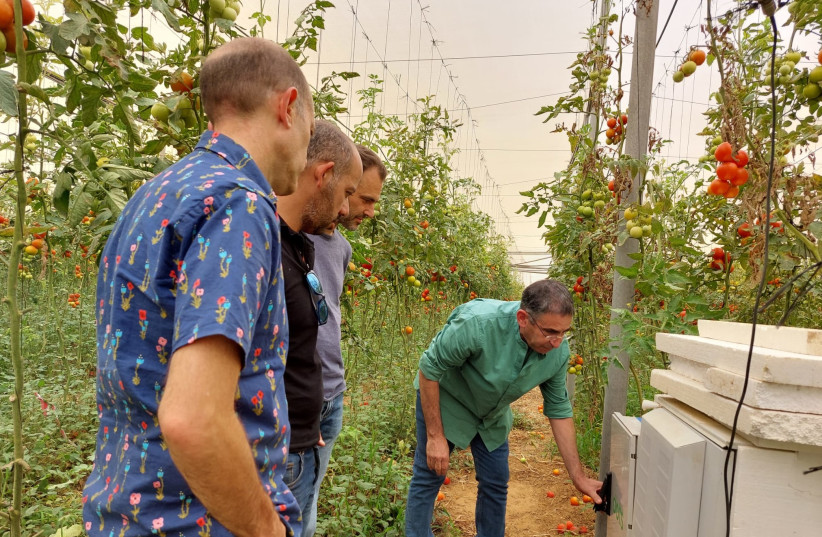Desertification Day: How Israel could help solve the desertification crisis
More than 2 billion of the world’s population live in deserts and drylands, accounting for nearly 40% of the earth. The expansion of the desert—desertification—could have severe and negative impacts on these people’s lives, including food security, health, biodiversity and more.
On Saturday, the world observed “World Day to Combat Desertification and Drought.” Israel is at the forefront of mitigating desertification. In the Negev Desert, Israeli innovation offers the world ways to build resilient crops, water technologies, clean energy and other tools.
“There is hope,” said Nicole Hod-Stroh. “Israel’s Negev is leading this hope and should be a source of national pride.”
Hod-Stroh is CEO of the Merage Foundation Israel, a board member of the Israel Innovation Institute (III) and founding partner of the DeserTech Community—a joint initiative of the Merage Foundation, III, the Ministry of Environmental Protection and Ben Gurion University of the Negev. The idea is to encourage entrepreneurism and innovation around solving four of the most significant challenges of the desert: extreme temperatures, water scarcity, remote communities soil degradation.
 World Day to Combat Desertification and Drought (credit: COURTESY/DOTS)
World Day to Combat Desertification and Drought (credit: COURTESY/DOTS)Developing the DeserTech community
The idea of building an official DeserTech Community was planted several years ago when Minister Nir Barkat, then mayor of Jerusalem, brought representatives of the Harvard Business School’s Institute for Strategy and Competitiveness, where the Porter cluster program was invented, to evaluate the Negev. The idea was to build a community of linked industries and institutions—from suppliers to universities to government agencies—around what the representatives coined DeserTech.
The DeserTech Community formally launched three years ago, Hod-Stroh said and enjoys $3 million in annual investment from the Merage Foundation and the Ministry of Environmental Protection.
A few months ago, the community launched the DeserTech Marketplace website, where more than 80 related start-ups, mainly in agriculture, water, infrastructure and energy, are featured, and companies can be located according to what challenges they are trying to solve. Most companies are in the Negev, but not all of them.
Last year, the DeserTech Community and Start-Up Nation Central released a mapping of the country’s companies focused on DeserTech, including 66 concentrating on desertification challenges as part of their core business. In addition, another 237 offered related solutions. The report showed that funding for these companies was on the rise: From 2017 to 2021, funding increased by 437%, according to the report.
Approximately 17% of DeserTech start-ups were from the Negev, while only 2-3% of Israeli start-ups, in general, are from the region.
The impact of the DeserTech Community is already being seen.
Earlier this year, the “Great Green Wall” countries of the United Nations took part in a joint program between the DeserTech Community and the United Nations Convention to Combat Desertification (UNCCD) to find innovative solutions to tackle their most critical desert-related challenges.
In March, Israel hosted a delegation of African agricultural experts through the program, some of whom have no diplomatic relations with Israel.
“Desertification and climate change pose a danger to many countries. Israel is fighting this threat at home and providing its experience and capabilities to benefit Africa,” Foreign Minister Eli Cohen said. “We will continue to deepen and strengthen our ties with countries that want to do so for prosperity and to build stability in the region.”
The countries involved in the program are what are known as Sahelian countries—countries that lie on the southern edge of the Sahara Desert: Burkina Faso, Chad, Djibouti, Eritrea, Ethiopia, Mali, Mauritania, Niger, Nigeria, Senegal and Sudan. They are working together to restore 100 million hectares of degrading land by 2030, which will simultaneously and naturally capture 250 million tons of carbon and create 10 million green jobs.
The DeserTech Community offered participants workshops, training sessions and field trips to acquire skills and knowledge to identify challenges, assess potential technologies and write concrete project proposals ready for implementation in their respective countries.
Hod-Stroh said that solutions were already identified, and now the program is raising funds from international organizations and investors to help implement them.
Desertification and Drought Day was officially declared by the UN General Assembly and is meant to promote public awareness of the issues but also to “let people know that desertification and drought can be effectively tackled, that solutions are possible and that key tools to this aim lay in strengthened community participation and cooperation at all levels,” the UN website says.
The Merage Foundation realized “Israel has no future if it does not develop the periphery,” Hod-Stroh said. But the drive is to create something other than another Tel Aviv.
“With all the different R&D institutions in the Negev, including eight agriculture institutions, BGU and its Jacob Blaustein Institutes for Desert Research, dozens of wineries that have proven you can grow vineyards in the middle of the desert, and experts in the field of solar energy and desert agriculture, we have proof that we can create a thriving ecosystem around desert preservation.
“Now we need to connect these stakeholders to the rest of the world.”





Comments are closed.